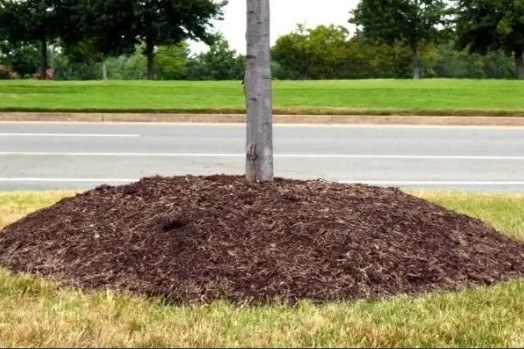Posted: March 23, 2022
Mulch is a good thing, too much mulch is not a good thing.

Avoid a mulch volcano!
The time of year is approaching when people start applying mulch to their gardens and yards. Almost everyone knows that mulch is simply a layer of various organic materials placed on the surface of the soil around landscape plants and trees. We have all seen it. You drive by a freshly mulched property and see it -- an appealing bed or tree with a "volcano of mulch" versus a modest two to four inch layer.
Organic mulch such as pine needles, wood chips, or bark will decompose and actually improve the soil over time. Mulch can provide many benefits such as:
- Reducing evaporation from the soils surface.
- Promoting soil microorganism activity improving soil texture.
- Stabilizing soil moisture.
- Controlling weeds.
- Controlling erosion.
- Enhancing the appearance of the planting and providing a finished look.
An additional benefit around trees is that mulch creates a "mow-free zone" around the base of the trunk. Since mulch controls the growth of weeds or grass close to the tree trunk, it eliminates the need to get close to the trunk with a mower or a string trimmer. Both of those implements can cause substantial damage when they accidentally "ding" the tree trunk, cutting into the bark creating ideal conditions for disease or insect problems.
So, while mulch is a good thing, too much mulch is NOT a good thing. A "mulch volcano" results when one piles mounds of mulch right up a tree trunk. Since this approach looks like a volcano, the term has been widely adopted. So if mulch is good, what's wrong with mulch volcanoes? Mulch that actually touches and covers the flared area at the base of a tree is a problem no matter what its depth. You should be able to see the trunk AND the flare at the base of the tree, the portion of the tree that widens as it goes into the soil.
Mulch can trap and retain moisture. Tree bark does not benefit from constant moisture. When the mulch remains moist, that moisture eventually penetrates the bark and suffocates the cells of the layer of tissue (phloem) that transfers food up and down the plant. Once that food supply is compromised, roots start to die leading to slow decline and eventual death. Once a tree is weakened by moisture or rot issues secondary problems can develop: insects, including borers, fungi, and bacteria can start to invade. That big volcano of mulch is a great hiding place for bark-eating rodents, mice and voles.
Another reason mulch volcanoes are dangerous may sound completely wrong. An overly thick layer of mulch can actually keep water from reaching the soil under the tree. Imagine what it takes to get rainfall to penetrate a foot or so of mulch, or think how long a sprinkler would have to run to thoroughly saturate all that mulch and reach the soil below it. If insufficient water penetrates the mulch, feeder and secondary tree roots can actually migrate up into the mulch seeking water. These roots grow above the tree's main roots, and once they reach the drier edge of the mulch volcano, they can start to encircle the tree.
If you have mulch volcanoes, remove the material at the base and flare area of the tree. Once the tree base is free of old mulch, leave several inches between the trunk and the first bit of mulch. Think of surrounding the tree with a "donut" of mulch that leaves room for air and water to flow freely in the first few inches immediately around the trunk. Then add mulch to a depth of two to four inches or so out as far from the trunk as you want. Your trees will thank you and live a better life.
Connie Holland is a Penn State Master Gardener from Adams County. The Penn State Cooperative Extension of Adams County is located at 670 Old Harrisburg Road, Suite 204, Gettysburg, phone 334-6271.
Monday videos: Visit us on Facebook, Instagram and TikTok at Penn State Master Gardeners in Adams County for our Master Gardeners' Monday Videos. Timely and relevant topics will be discussed on a weekly basis keeping readers up to date on current horticultural issues.
Ag Explorers Day Camp gives kids ages 8 - 12 an opportunity to learn through doing. "Ag Around the World" is our theme this year - June 20 - 24, 8am - 4pm. Fee: $160. To register, visit 4-H ZSuite, choose club: Ag Explorers Club, and Project: Ag in the Classroom/Acres of Adventure. Deadline to register is June 3, 2022. Space is limited, so register early to reserve your child's spot!

